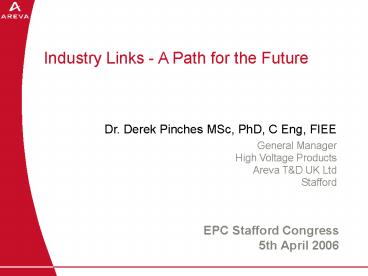EPC Stafford Congress - PowerPoint PPT Presentation
1 / 14
Title:
EPC Stafford Congress
Description:
supply chain management. quality. project management. contract law. 12. Changes to Industrial Links ... courses, eg project based MSc/M Phil courses as a ... – PowerPoint PPT presentation
Number of Views:42
Avg rating:3.0/5.0
Title: EPC Stafford Congress
1
Industry Links - A Path for the Future
Dr. Derek Pinches MSc, PhD, C Eng, FIEE
General Manager High Voltage Products Areva TD
UK Ltd Stafford
- EPC Stafford Congress
- 5th April 2006
2
Topics
- Introduction
- Changes in the UK Heavy Manufacturing Industry
- Changes to Industrial Links
- Vision of the Future
3
Introduction
- What Industry Needs
- excellence in engineering and technology in
higher education - industry links considered as a two way process
- service offered by colleges and universities to
industry to provide higher education and research
facilities - industry to provide feedback to ensure colleges
and universities are kept up to date with new
technologies, processes etc - identify changes in UK industries in particular
heavy manufacturing - review links between industry and academia for
current and future needs
4
Changes in the UK Heavy Manufacturing Industry
- UK Heavy Manufacturing Industry to early 1970s
- UK world leader in heavy manufacturing for
traditional industries, electrical, mechanical
and chemical industries etc - factories self supporting, many components
manufactured in house, (ie machine components,
sub assemblies and testing, less outsourcing) - own research facilities often linked to
Universities - traditional craft and student apprenticeships
5
Changes in the UK Heavy Manufacturing Industry
- UK Heavy Manufacturing Industry to early 1970s
(continued) - skill required tended towards silo process
- design engineer narrow field of responsibility
but specialist in that area - Higher Education tailored to this field
- Industry generally had extensive research and
test centres - research work was often carried out in joint
cooperation with Universities. - Higher Education was part time (day/evening) and
full time courses
6
Changes in the UK Heavy Manufacturing Industry
- UK Heavy Manufacturing Industry from 1970s to
present day and future - decline of heavy engineering industries in UK to
overseas - mergers, factory closures
- relocation to overseas mainland Europe, third
world countries, China, India - technology retained in UK and Europe
7
Changes in the UK Heavy Manufacturing Industry
- UK Heavy Manufacturing Industry from 1970s to
present day and future - remaining industries reduced scope
- design
- outsourcing for components and sub assembly
- final assemblies
- limited test facilities
- traditional skills in decline
- changes in industry links
8
Changes in the UK Heavy Manufacturing Industry
- UK Heavy Manufacturing Industry from 1970s to
present day and future - skill requirements tending towards non silo
process, - engineering becoming less specialised (with the
exception of research) - engineers need to cover wider scope and become
interdisciplinary - application engineering
- CAD
- supply chain management
- project management
- contract law
9
Changes in the UK Heavy Manufacturing Industry
- UK Heavy Manufacturing Industry from 1970s to
present day and future - skill requirements tending towards non silo
process - reduced size of manufacturing companies
- reduced range of skills and activities
- engineering becoming less specialised (with the
exception of research) - engineers taking on more and more duties outside
the traditional engineering duties - distinction between commercial and engineering
work becoming less defined - engineers now taking responsibility for Project
Management
10
Changes in the UK Heavy Manufacturing Industry
- UK Heavy Manufacturing Industry from 1970s to
present day and future - change is consistent with visions with the
formation of the new IET by IEE and IIE - interdisciplinary engineers no longer work
within boundaries of traditional disciplines - global generate acquire and distribute knowlege
globally - inclusiveall stages of the engineering lifecycle
need to be interlinked
11
Changes to Industrial Links
- Training Engineers to meet the future
- future engineers need to be trained in
multi-disciplined subjects, technical and non
technical subjects - academia and industry needs to continue to
develop suitable academic courses to include - application engineering
- CAD
- supply chain management
- quality
- project management
- contract law
12
Changes to Industrial Links
- Training Engineers to meet the future
- continuing professional development (CPD)
- colleges and universities offer top up courses
for mature students - industry provide interface between academia and
industry with short bespoke courses - post graduate courses, eg project based MSc/M
Phil courses as a catalyst for research projects
13
Vision of the Future
- Plan today for the Future
- need for academia and industry to work together
to move technology forward - industry to utilise resourses of academia to
carry out/ assist in research projects - encourage continual professional development for
young and mature students - academia to work with industry to create
appropriate courses to train and qualify multi
disciplined engineers for the future - there is a future in engineering which is vital
for the UK economy
14
- Thanks For Your Attention
15
(No Transcript)































